David Ford: An Owl, then a Blade - and a career blighted by bad luck
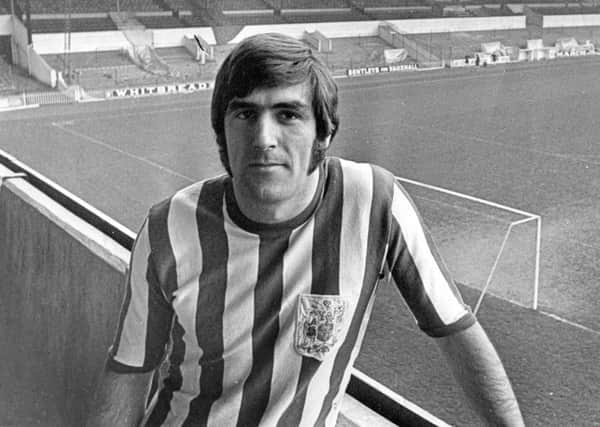

Sadly, his sparkling goal-scoring career was blighted by tragedy and sheer bad luck.
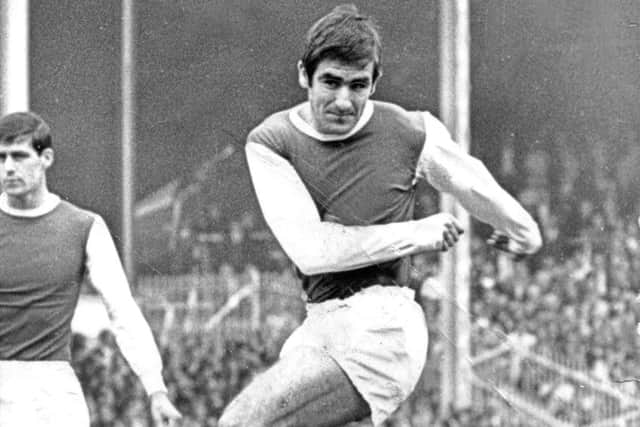

Born in Sheffield on March 2, 1945, David played for Sheffield Boys and then Sheffield Grammar Schools XI before joining the Owls aged 18.
Advertisement
Hide AdAdvertisement
Hide AdJust before the start of the 1964-65 season, a coup for the Owls’ board was persuading manager Alan Brown, well respected amongst players, to move to Hillsborough.
At Wednesday, David, with a shock of black hair, quickly showed great promise and gained a reputation for being fast, resourceful and having a good shot.
He impressed in the Central League games in the 1963-64 season snapping 20 goals and at the beginning of August 1964 won a place on a trip to Germany with the Owls’ pre-season tour party.
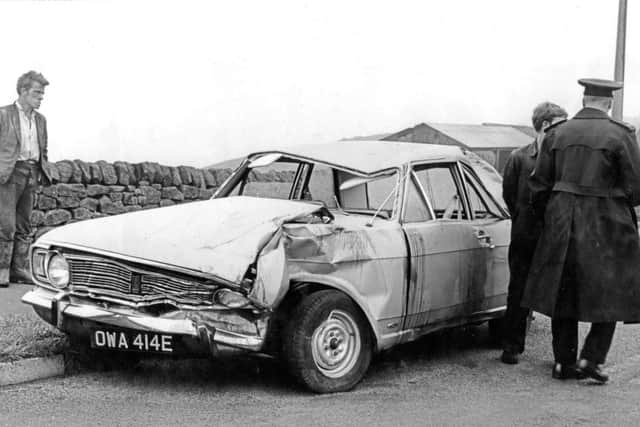

David made his first appearance at inside right for the senior side on Thursday August 13, 1964 against Germany’s Super League team Werder Bremen.
Advertisement
Hide AdAdvertisement
Hide AdBefore the game he said: “I’m thrilled, delighted and grateful. It’s a big chance and I will do my best not to let anyone down.”
Frustratingly, it was a heartbreak debut. He played magnificently until the 75th minute when he was carried off on a stretcher with badly torn knee ligaments.
He hobbled home to Sheffield and the Royal Infirmary on crutches. He was expected to be out for around eight weeks.
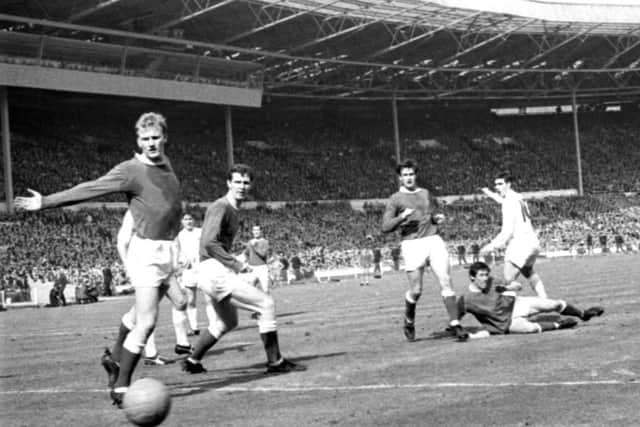

His recuperation continued into October 1964 and the Owls’ doctor ordered him to splash out five shillings a week on a get fit campaign - in a local swimming pool. Swimming was the doctor’s prescription to strengthen the torn ligaments.
Advertisement
Hide AdAdvertisement
Hide AdDavid made his first team league debut on October 23 1965 against Sunderland and scored his first goal in a home League victory over Fulham on November 20, 1965.
In the run up to the Owls’ legendary 1966 Wembley Cup Final appearance against Everton, David scored in the fifth round victory over Huddersfield Town, and twice in the quarter final win at Blackburn Rovers.
When he slid in a second goal at Wembley after 57 minutes, many thought it was to be a glorious day for the Owls. Alas, that was not to be.
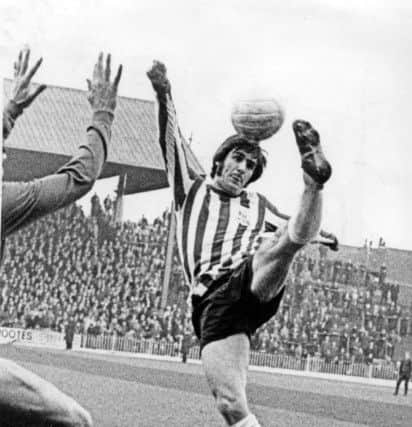

Playing 40 league games in the 1966-67 season, his speed off the mark, flair and danger in the opposition penalty area made him joint leading scorer with John Ritchie both notching up 15 goals.
Advertisement
Hide AdAdvertisement
Hide AdDuring that season he also won two caps for the England Under 23 team.
Tragically, on Monday night September 11 1967, whilst on his way to team mate Johnny Quinn’s house in Langsett Road, David was involved terrible car crash.
In wet and misty conditions, his vehicle hit a parked car near the Sportsman Inn at Redmires Road, Lodge Moor, killing his fiancee, Susan Fidler.
As a result of the crash, David injured his right knee and needed an immediate operation. He also had stitches in superficial scalp wounds.
Advertisement
Hide AdAdvertisement
Hide AdAfter months of sweat and toil he returned to the League scene on November 25, coming on as second half substitute against Newcastle.
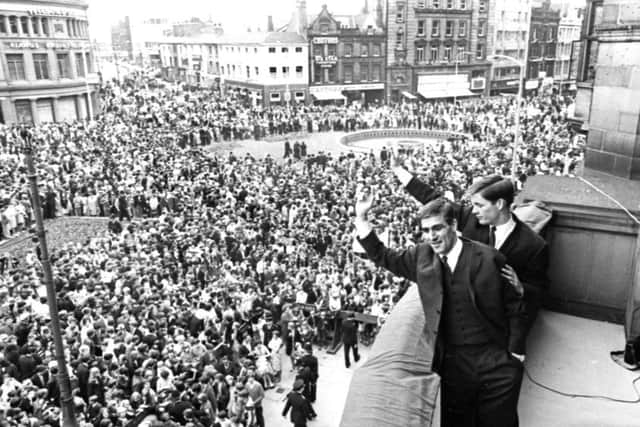

By the middle of December 1967, that game was his only 45 minutes of League football in the previous 14 weeks and he was dealt another setback.
A specialist advised him an operation was required on his left knee. Manager Brown said that David’s zest and energy had been sadly missed by Wednesday and that the player was expected to be out of football for ‘some weeks’. David had twice injured his left knee during training.
Appearing at court in Sheffield in February 1968, to answer a charge of dangerous driving relating to the death crash in the previous September, David said: “I was suddenly faced by some tyres in the road. I braked, skidded then the car turned over.”
Advertisement
Hide AdAdvertisement
Hide AdHe argued he had been travelling at 55-60 - in a 70 mile limit - and denied the charge.
His solicitor Michael Barrass said the accident would not have happened if workmen had heeded a police warning.
Three days before the accident, a patrol car crew was also faced with a line of tyres across the road. They warned the workmen about the danger and Mr Barrass commented that it “seemed absurd to prosecute Ford and not those who placed the tyres across the road.”
The tyres were there to allow a tractor to cross without damaging the road. David’s argument was not accepted and he was fined £20 with £10 costs and his licence endorsed.
Advertisement
Hide AdAdvertisement
Hide AdIn March 1968, when sidelined once more after a comeback game against Fulham, he confessed in a Star interview he was sick with all the injuries and worried, but would keep on fighting to be fit.
Manager Jack Marshall added: “The boy deserves a break. He has taken mental as well as physical blows.”
In December 1969 he was transferred from Hillsborough to St James’ Park, Newcastle in a straight swap deal for Scottish international winger Jackie Sinclair.
For Wednesday, David made 130 appearances, five as substitute, and scored 37 goals.
Advertisement
Hide AdAdvertisement
Hide AdAn operation on a leg injury in May 1970, prompted Star sports man Tony Pritchett to call David “one of the unluckiest players in the game.”
David played 26 league games in his 14 month stay at Newcastle, scoring three goals before being signed by Sheffield United, then in the old Second Division.
On returning to Sheffield, he was a bit nervous on making his first appearance before a Bramall Lane crowd as a United and not a Sheffield Wednesday player.
Said David: “I just feel a little apprehensive in the circumstances because I am desperately keen to do well in Sheffield again.
Advertisement
Hide AdAdvertisement
Hide Ad“I have been given a great welcome by the United players, some of whom I already know of course.”
He added that the dressing room spirit at the Lane seemed tremendous and there had been some marvellous improvements behind the scenes.
Though he was delighted to have the chance of returning to his home city, he had a good look at the League table before saying ‘yes’.
This was because one of the few regrets he had about leaving Newcastle was dropping back from the First Division. He stated Blades were a good side and there was an air of determination about the place.
Advertisement
Hide AdAdvertisement
Hide AdAnother factor that helped him make his mind up was hearing about the transfer to United of Trevor Hockey, which seemed further proof that the club wanted to make the most of a promotion chance.
At that time, the Star reported he was the fifth player in history to wear the colours of both Sheffield clubs. The others were Bernard Oxley, George Underwood, Joe Cockroft and Walter Rickett.
Naturally, David was the subject of some leg pulling.
“Some of my best friends were Unitedites, when I was with Wednesday and I’m still friendly with Wednesdayites now I’m with United.”
Whilst with the Blades, David made 21 appearances and scored two goals. A move to Halifax Town saw him play 83 league games and score six goals.
Advertisement
Hide AdAdvertisement
Hide AdAfter being released by the club in May 1976 he went on to have a number of business interests including running his own plumbing and heating business, DIY plumbing centre, and owning licensed premises.